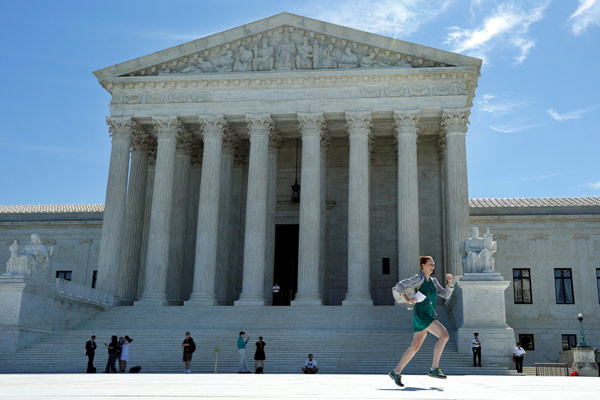US Supreme Court breathes new life into Trump's travel ban
 |
|
A news assistant runs out after the US Supreme Court granted parts of the Trump administration's emergency request to put his travel ban into effect immediately while the legal battle continues, in Washington, June 26, 2017. [Photo/Agencies] |
WASHINGTON - The US Supreme Court on Monday handed a victory to President Donald Trump by reviving parts of a travel ban on people from six Muslim-majority countries that he said is needed for national security but that opponents decry as discriminatory.
The justices narrowed the scope of lower court rulings that had completely blocked key parts of a March 6 executive order that Trump had said was needed to prevent terrorism in the United States, allowing his temporary ban to go into effect for people with no strong ties such as family or business to the United States.
The court issued its order on the last day of its current term and agreed to hear oral arguments during its next term starting in October so it can decide finally whether the ban is lawful in a major test of presidential powers.
In a statement, Trump called the high court's action "a clear victory for our national security," saying the justices allowed the travel suspension to become largely effective.
"As president, I cannot allow people into our country who want to do us harm. I want people who can love the United States and all of its citizens, and who will be hardworking and productive," Trump added.
Trump's March 6 order called for a blanket 90-day ban on people from Iran, Libya, Somalia, Sudan, Syria and Yemen and a120-day ban on all refugees while the government implemented stronger vetting procedures. The court allowed a limited version of the refugee ban, which had also been blocked by courts, to go into effect.
Trump issued the order amid rising international concern about attacks carried out by Islamist militants like those in Paris, London, Brussels, Berlin and other cities. But challengers said no one from the affected countries had carried out attacks in the United States.
Federal courts said the travel ban violated federal immigration law and was discriminatory against Muslims in violation of the US Constitution. Critics called it a discriminatory "Muslim ban."
Ahmed al-Nasi, an official in Yemen's Ministry of Expatriate Affairs, voiced disappointment.
"We believe it will not help in confronting terrorism and extremism, but rather will increase the feeling among the nationals of these countries that they are all being targeted, especially given that Yemen is an active partner of the United States in the war on terrorism and that there are joint operations against terrorist elements in Yemen," he said.
Groups that challenged the ban, including the American Civil Liberties Union, said that most people from the affected countries seeking entry to the United States would have the required connections. But they voiced concern the administration would interpret the ban as broadly as it could.
"It's going to be very important for us over this intervening period to make sure the government abides by the terms of the order and does not try to use it as a back door into implementing the full-scale Muslim ban that it's been seeking to implement," said Omar Jadwat, an ACLU lawyer.
During the 2016 presidential race, Trump campaigned for "atotal and complete shutdown" of Muslims entering the United States. The travel ban was a signature policy of Trump's first few months as president.









